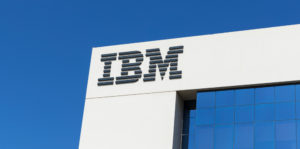
(Yurchanka Siarhei/Shutterstock)
IBM lately launched Cloud Logs, a brand new answer designed to permit prospects to effectively gather and analyze log information at any scale. IBM isn’t any slouch within the product improvement division, however Huge Blue realized its internally developed observability options couldn’t match what was developed by one firm: Coralogix.
As essentially the most voluminous of the Holy Trinity of observability information (together with metrics and traces), logs are important for detecting IT issues, equivalent to misguided updates, the presence of hackers or malware, or boundaries to Internet utility scalability. Because of an acceleration in digital transformation initiatives, log information can also be rising shortly. In actual fact, by some measures, it’s rising 35% per 12 months, quicker than all information is rising as an entire.
That giant development is placing strain on firms to give you simpler and environment friendly methods to take care of their log information. The usual methodology of analyzing logs–which entails extracting the related data from logs, storing that data in an enormous database on quick storage, after which constructing indexes over it–is not slicing it within the new log world, in response to Jason McGee, an IBM Fellow and the CTO of IBM Cloud.
“We see that with information volumes constantly rising, the price of indexing logs and putting them in scorching storage has grow to be prohibitively costly,” McGee stated in a latest press launch. “Consequently, many firms have opted to pattern solely a subset of their information in addition to restrict storage retention to 1 or two weeks. However these practices can damage observability with incomplete information for troubleshooting and development evaluation.”
What firms want is a brand new strategy to log storage and evaluation. The strategy that IBM finally chosen is the one developed by Coralogix, an IT observability agency based mostly in Tel Aviv, Israel.
Streaming Logs
When Coralogix was based 10 years in the past, the corporate’s answer was largely based mostly on the Elasticsearch, Logstash, and Kibana (ELK) stack and used a conventional database to index and question information. Because the log volumes elevated, the corporate realized it wanted a brand new technological underpinning. And so in 2019, the corporate embarked upon a challenge to rearchitect the product round streaming information, utilizing Apache Kafka and Kafka Streams.
“It’s a method of organizing your databases–all of your learn databases and write databases–such that you may horizontally scale your processes actually simply and shortly, which makes it cheaper for us to run,” says Coralogix Head of Developer Advocacy Chris Cooney. “However what it actually means is that for purchasers, they will question the information at no further value. Which means unbounded exploration of the information.”
As an alternative of constructing indexes and storing them on high-cost storage, Coralogix developed its Strema answer round its 3 “S” structure, which stands for supply, stream, and sink. The Strema answer makes use of Kafka Join and Kafka streams, runs atop Kubernetes for dynamic scaling, and persists information to object storage (i.e Amazon S3).

Coralogix’s Streama platform makes use of Kafka, Kubernetes, and object storage (Picture supply: Coralogix)
“What we do is we are saying, okay let’s do log analytics up entrance. Let’s begin there, and we’ll do it in a streaming pipeline sort of method, slightly than in a batch course of, within the database,” Cooney stated. “That has some actually vital implications.”
Along with adopting Kafka, Coralogix adopted Apache Arrow, the quick in-memory information format for information interchange. Clever information tiering that’s constructed into the platform mechanically strikes extra regularly accessed information from slower S3 buckets into quicker S3 storage. The corporate additionally developed a piped question language known as DataPrime to present prospects extra highly effective instruments for extracting helpful data from their log information.
“The great thing about it’s that they will principally hold all the information and handle their prices themselves,” Cooney stated. “They use one thing known as the TCO Optimizer, which is a self-service device that permits you to say, okay, this utility right here, the much less vital noisy machine logs, we’ll ship them straight to the archive. If we want them, we’ll question them immediately each time we wish.”
Logging TCO
Once you add all of it up, these technological variations give Coralogix the flexibility to not solely ship sub-second response to log occasions–equivalent to firing an alert on a dashboard when a log is distributed indicating the presence of malware–but additionally to ship very quick responses to advert hoc person queries that contact log information sitting in object storage, Cooney says. In actual fact, these queries that scan information in S3 (or IBM Cloud Storage, because the case could also be) typically execute quicker than queries in mainstream logging options based mostly on databases and indexes, he says.
“Once you mix TCO optimization in Coralogix with the S3 clever tiering…and the intelligent optimization of knowledge, you’re between 70% and 80% value discount compared to somebody like Datadog,” Cooney tells Datanami. “That’s simply within the log house. Within the metric house, it’s extra.”
Because of this innovation–particularly, pulling the price out of storing indexes by switching to a Kafka-based streaming sub-system–Coralogix is ready to radically simplify its pricing scheme for its 2,000 or so cusotmers. As an alternative of charging for every particular person part, the corporate costs for its logging answer based mostly on how a lot information the shopper ingests. As soon as it’s ingested, prospects can run all of the queries to their coronary heart’s content material.
“Information that beforehand was purely the realm of the DevOps crew, for instance…the DevOps groups will guard that jealousy hold that information. No one else can question it, as a result of that’s cash. You’re truly encouraging silos there,” Cooney says. “What we are saying is discover the information as a lot as you want. For those who’re a part of a BI crew, have at it. Go have enjoyable.”
IBM rolled out IBM Cloud Logs to prospects in Germany and Spain final month, and can proceed its international rollout by the third quarter.
Associated Gadgets:
OpenTelemetry Is Too Difficult, VictoriaMetrics Says
Coralogix Brings ‘Loggregation’ to the CI/CD Course of
Log Storage Will get ‘Chaotic’ for Communications Agency


